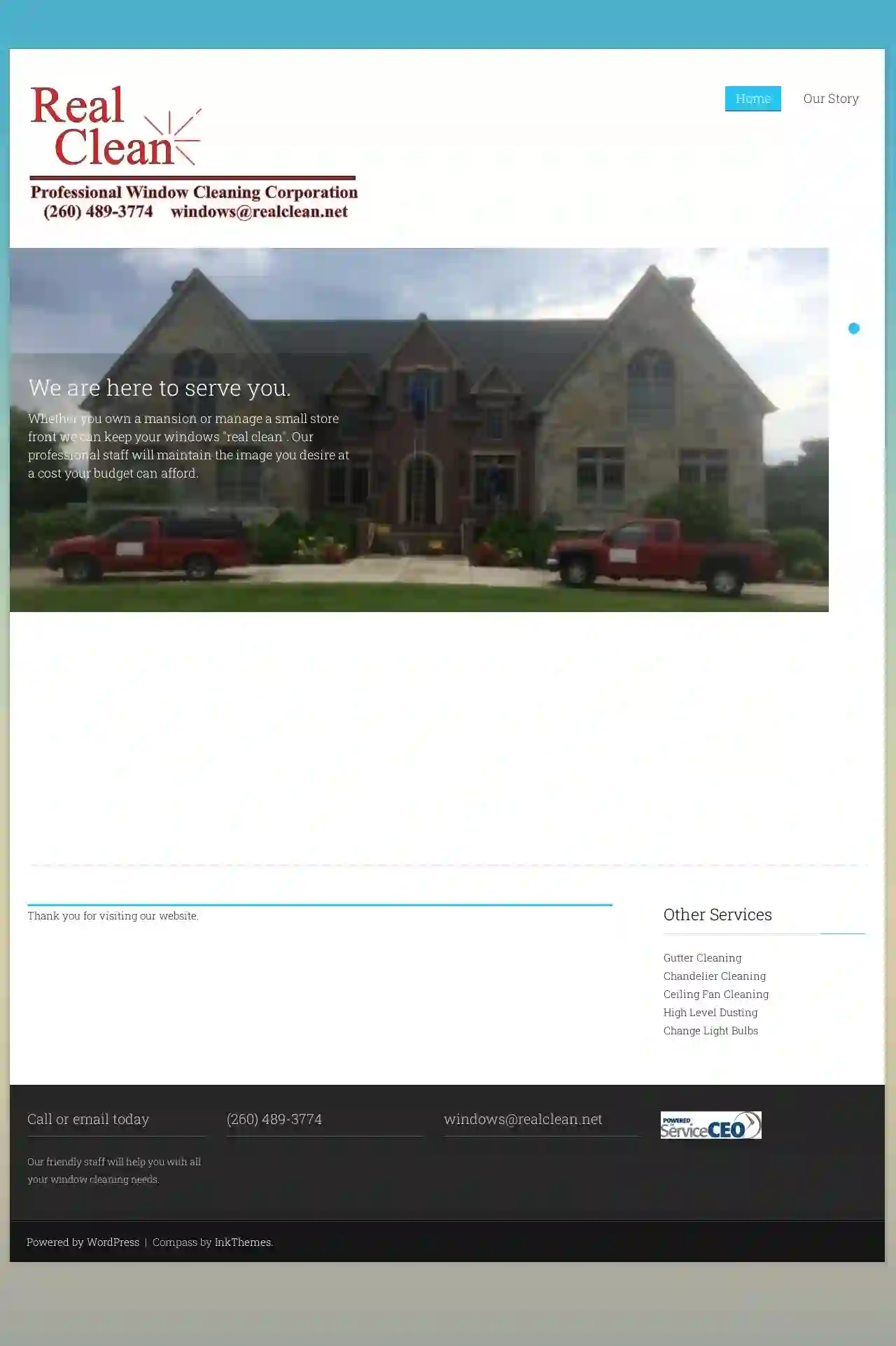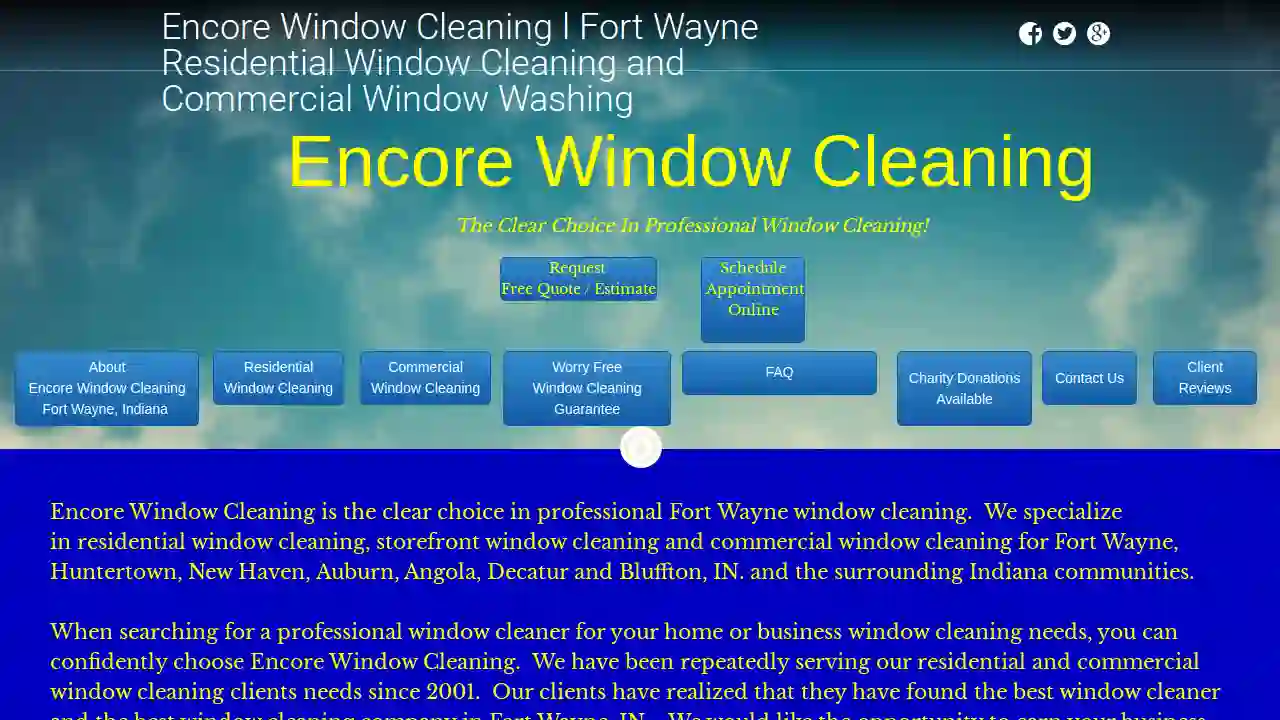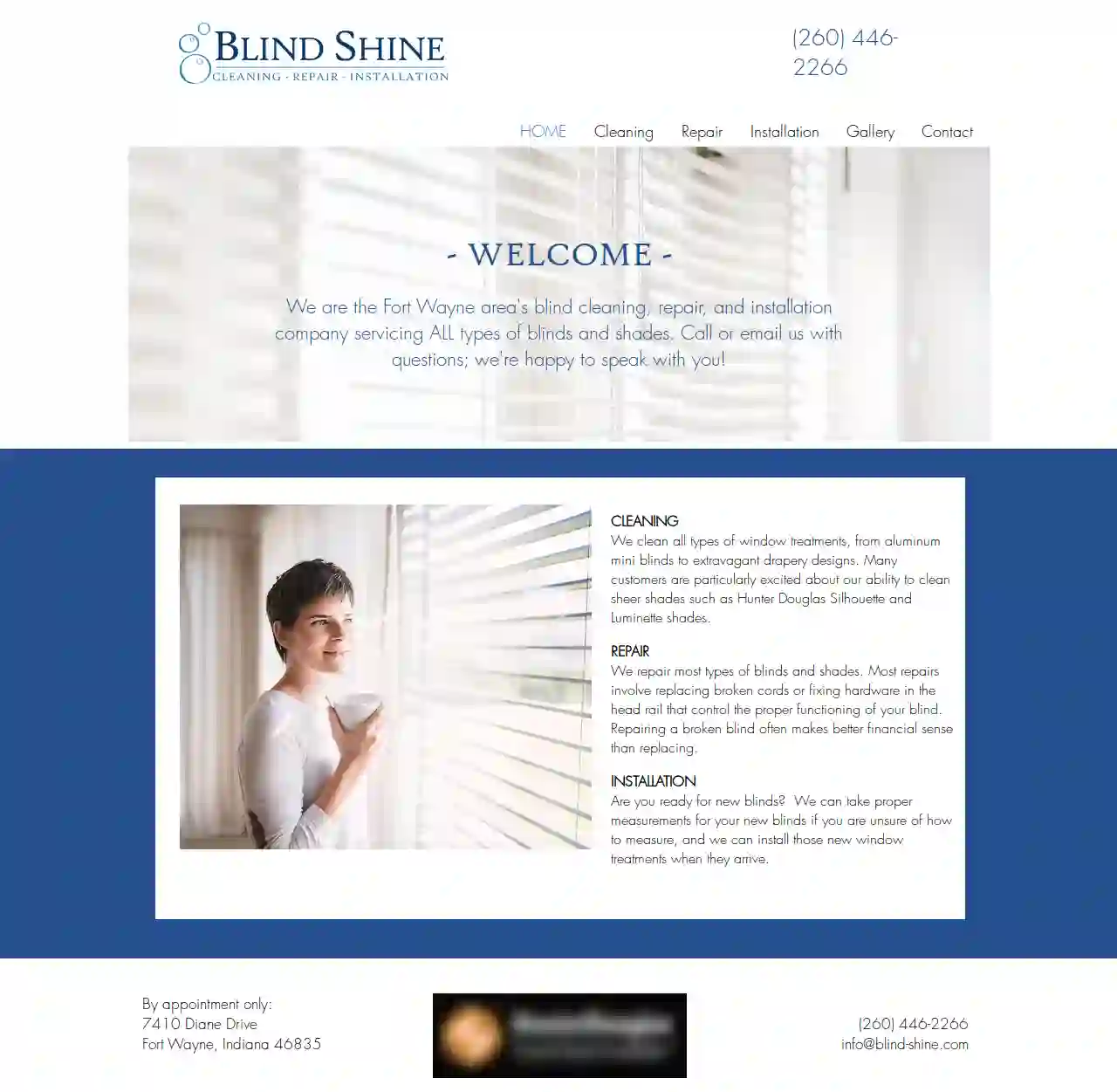Window Cleaning Red Bank
Top Professional Window Cleaning in Red Bank
Receive multiple Window Washing quotes for your project today! Compare profiles, reviews, accreditations, portfolio, etc... and choose the best deal.

It's Us or Dust
4.318 reviews260-310-3294, Fort Wayne, 46701, USTransform Your Home or Office with Our Cleaning Services We make your home/office spotless so you can enjoy the important things in life Schedule a Cleaning 260-310-3294 Affordable Cleaning Services by It’s Us or Dust One-Time Cleaning Our one-time cleaning service works well for those who need a clean home for a special occasion or event. Our professional cleaners will clean your home from top to bottom, leaving it sparkling clean. This service is ideal for move-in/out cleaning, spring cleaning, and post-party/event cleaning. Regular & Deep Cleaning Our professional cleaners will scrub and clean your toilets, showers, tubs, sinks, mirrors, floors, and woodwork in your bathrooms. This is ideal for removing mold, mildew, and soap scum. Our cleaners will scrub and clean the outside of your kitchen appliances, countertops, cabinets, sinks, floors, etc. This is ideal for removing grease, stains, and grime. Our professional cleaners will remove cobwebs, wipe all woodwork, furniture and knick-knacks/decor in living spaces and bedrooms. All upholstered furniture, stairs, and carpet will get vacuumed. Hard surface floors will get mopped. Our professional cleaners will also replace clean linens on beds upon request. Office/Commercial Building Cleaning This service is for those who need a clean office space. Our professional cleaners will clean your office from top to bottom, leaving it ready for a productive day. This service is ideal for businesses and startups. Post-Construction Cleaning Our post-construction cleaning service is perfect for those who have recently completed a construction project. Our professional cleaners will clean up any dust, debris and mess, leaving your home looking brand new. Move-in/Move-out Cleaning Our move-in/move-out cleaning service is great for those who need a clean home before or after moving. Our professional cleaners will clean your home from top to bottom, leaving it ready for the next occupant. We also provide cleaning for staging before putting your home on the market. Window Cleaning Our window cleaning service is perfect for those who need clean windows. Our professional cleaners will clean your windows leaving them sparkling clean. Customized Cleaning Plans We understand every home is unique and has different cleaning needs. Therefore, we offer customized cleaning plans tailored to meet your specific requirements. Our cleaning experts will visit your home and create a cleaning plan that works best for you. Have a budget you’d like to stick to? We can help create a priority list to get the most important areas completed for you. About It’s Us or Dust Our Story At It’s Us or Dust, we started this business with a passion for providing a clean and healthy home environment. Our team of experienced cleaners is dedicated to delivering high-quality cleaning services that exce
- Services
- Why Us?
- Accreditations
- Our Team
- Testimonials
- Gallery
Get Quote
Real Clean Incorporated
4.73 reviewsWayne, USWe are here to serve you. Whether you own a mansion or manage a small storefront we can keep your windows "real clean". Our professional staff will maintain the image you desire at a cost your budget can afford. From corporate headquarters to the family cottage Our trained technicians provide safe and efficient solutions to all your window cleaning needs. No matter what time of year we can get your windows "real clean". Property Managers Since 1977 we have been helping professionals like you keep your boards and clients happy with the very best window cleaning services available. Call us for a free quote Cleaning Companies Windows are the first thing your customers see when they arrive at their buildings. Let our uniformed professionals help you maintain that "real clean" look all year round. Contractors Our trained and experienced technicians can help you meet your deadlines with the assurance that your glass will be clean and without any surface damage. Thank you for visiting our website.
- Services
- Why Us?
- Gallery
Get Quote
Diamond Clean Exteriors
Wayne, USDiamond Clean Exteriors is the premier exterior cleaning service in the Fort Wayne area. We pride ourselves on providing top-notch services to a variety of clients, from commercial and industrial properties to residential properties. With a service area that covers a 50 mile radius around Fort Wayne, we are dedicated to ensuring that your property looks its absolute best. More About Us Why Choose Us We Offer Services Over a 50-Mile Radius Free, in Person Quotes Fill out our Contact form to set up an in person consultation! Award Winning Services Fully Insured Jaime C. We had Aj with Diamond Clean Exteriors out to remove an old chain link fence and install an expanded privacy fence. After diligently working through all the weather Indiana could throw at him, the project was completed and looks fabulous! We love our new outdoor space! With more than fair pricing, and a wide variety of services offered, we're already thinking about the next projects we could use help with. Would definitely recommend, and will definitely be hiring AJ for more projects in the future. Thanks again! Free Quotes CONTACT US
- Services
- Why Us?
- Our Team
- Testimonials
- Gallery
Get Quote
Window World of Fort Wayne
4.1172 reviews2224 Contractors Way, Fort Wayne, 46818, USWindow World of Fort Wayne installs energy-efficient windows, doors, siding, and more for homeowners around Fort Wayne, IN. We're increasing curb appeal, improving efficiency, and enhancing quality of life one home at a time. Proudly Made in America, we source materials from the USA and are committed to this tradition. We have solutions for your entire home exterior. Windows are just the beginning. We provide the customer service of a small business backed by a nationally recognized brand. We give you quality and service that goes far beyond anyone else. We opened our doors in 2003 with a promise: "Superior Products, Professionally Installed, at a Guaranteed Low Price". Our quality products, professional local installers, and comprehensive warranties ensure that you’ll always have peace of mind.
- Services
- Why Us?
- Accreditations
- Testimonials
- Gallery
Get Quote
Hook & Ladder Cleaning
518 reviewsWayne, USHook & Ladder Cleaning is your go-to pressure washing company in Fort Wayne, IN. We specialize in both commercial and residential exterior cleaning, taking care of the dirt and grime so you can enjoy the beauty of a freshly cleaned home or business. Whether you need a one-time deep clean or regular maintenance, our team delivers exceptional results. We're proud to be a firefighter and military-owned and operated company, committed to providing reliable and trustworthy service. At Hook & Ladder Cleaning, we offer a wide range of services, including window cleaning, soft washing, pressure washing, roof cleaning, gutter cleaning, gutter guard installation, and holiday lighting. We're fully licensed and insured, giving you peace of mind knowing your property is in safe hands. Choose Hook & Ladder Cleaning for a hassle-free experience with easy payment options and a satisfaction guarantee. Contact us today for a free quote!
- Services
- Why Us?
- Gallery
Get Quote
Welcome Window Washing LLC
528 reviewsWayne, USWelcome Window Washing is a high quality residential and commercial window cleaning company. Our focus is to provide a consistently top-knotch service with excellent customer service relations. We stand apart from other window cleaning companies because of our commitment to quality and innovation. We use the latest techniques and equipment to attain results that earn our company the trust of our customers. Fast and Friendly | Free Estimates | Fully Insured | Flexible Scheduling
- Services
- Why Us?
- Our Team
- Gallery
Get Quote
Merry Maids
4.237 reviewsMonticello, MN, 154 Broadway St E, 55362, USAt Merry Maids, we realize how making time for home chores can seem impossible – that’s why we’re here. Our name is backed by 40 years of experience caring for homes just like yours. Our Fort Wayne cleaning service gives you back the time you deserve by taking care of your home and allowing you to enjoy more of life’s moment. It’s time to live more and clean less.
- Services
- Why Us?
- Testimonials
- Gallery
Get Quote
ENCORE WINDOW CLEANING
54 reviews12345 Main Street, Suite 100, Fort Wayne, 46801, USEncore Window Cleaning is a locally owned and operated professional window cleaning service. We have been providing dependable, reliable, quality window washing services since 2001. We specialize in residential window cleaning, storefront window cleaning and commercial window cleaning for Fort Wayne, Huntertown, New Haven, Auburn, Angola, Decatur and Bluffton, IN. and the surrounding Indiana communities. When searching for a professional window cleaner for your home or business window cleaning needs, you can confidently choose Encore Window Cleaning. Our clients have realized that they have found the best window cleaner and the best window cleaning company in Fort Wayne, IN. We would like the opportunity to earn your business also. We are fully insured and have a 2 Million Dollar General Liability Insurance policy. Encore Window Cleaning is the clear choice in professional Fort Wayne window cleaning. We have been repeatedly serving our residential and commercial window cleaning clients needs since 2001. Schedule an appointment online or call us today for a free quote!
- Services
- Why Us?
- Gallery
Get Quote
Elite Window Cleaning
516 reviewsWayne, USElite Window Cleaning is dedicated to providing you with crystal-clear views. We understand that clean windows can significantly impact the ambiance of your home and the appearance of your business. However, window cleaning can be a demanding and potentially hazardous task. That's where Elite Window Cleaning comes in. We are committed to exceeding your expectations by delivering professional and reliable window cleaning services. Our Promise: It's simple, we guarantee that you will love our work or we will come back and make it right! What We Offer: Whether you need a professional cleaning for your next gathering, are in the midst of a spring cleaning, want a crystal clear view looking out at the lake house, or looking to enhance the look of your business, Elite is committed to exceeding your expectations. How We Clean: Learn about our process here
- Services
- Why Us?
- Gallery
Get Quote
Blind Shine Inc
53 reviews7410 Diane Drive, Fort Wayne, 46835, USWe are the Fort Wayne area's blind cleaning, repair, and installation company servicing ALL types of blinds and shades. Call or email us with questions; we're happy to speak with you! We clean all types of window treatments, from aluminum mini blinds to extravagant drapery designs. Many customers are particularly excited about our ability to clean sheer shades such as Hunter Douglas Silhouette and Luminette shades. We repair most types of blinds and shades. Most repairs involve replacing broken cords or fixing hardware in the head rail that control the proper functioning of your blind. Repairing a broken blind often makes better financial sense than replacing. Are you ready for new blinds? We can take proper measurements for your new blinds if you are unsure of how to measure, and we can install those new window treatments when they arrive.
- Services
- Why Us?
- Gallery
Get Quote
Over 60,241+ Janitorial Companies in our network
Our cleaning service providers operate in Red Bank and beyond!
CleaningMatch has curated and vetted Top Cleaning Services in Red Bank. Find a trustworthy contractor today.
Frequently Asked Questions About Window Cleaning
- Number of Windows: The more windows you have, the higher the cost will generally be.
- Size and Type of Windows: Large windows, multi-paned windows, or windows with special features (e.g., skylights) may cost more to clean.
- Accessibility: Windows that are difficult to reach (e.g., high-rise windows) will require specialized equipment and may cost more.
- Interior vs. Exterior: Cleaning both interior and exterior windows will cost more than cleaning just one side.
- Frequency: Regular cleaning schedules often come with discounted rates compared to one-time cleanings.
- First Impressions: Sparkling clean windows create a positive first impression, making your property look more inviting and well-maintained.
- Natural Light: Clean windows allow more natural light to enter, brightening the interior and making it appear more spacious and appealing.
- Enhanced Views: Clear windows provide unobstructed views of the surroundings, showcasing the beauty of your property and its surroundings.
- Increased Value: A well-maintained exterior, including clean windows, can increase the perceived value of your property.
- Clean on a Cloudy Day: Direct sunlight can cause the cleaning solution to dry too quickly, leaving streaks. Cleaning windows on a cloudy day or in the shade is best.
- Use the Right Tools: Microfiber cloths are ideal for cleaning glass as they are lint-free. Squeegees are also effective for removing cleaning solution without streaks.
- Clean from Top to Bottom: Start cleaning from the top of the window and work your way down to prevent drips from causing streaks on already cleaned areas.
- Overlap Squeegee Strokes: When using a squeegee, overlap each stroke slightly to ensure complete coverage and prevent streaks.
- Wipe the Squeegee Blade: Wipe the squeegee blade clean after each stroke to remove dirt and moisture that can cause streaks.
Can I clean my own windows effectively?
If you choose to clean your own windows, use a good quality glass cleaner and microfiber cloths. Avoid cleaning windows in direct sunlight, as the cleaning solution can dry too quickly and leave streaks. It's also crucial to take safety precautions if you're cleaning high windows, using a stable ladder and having someone spot you.
How much does professional window cleaning cost?
To get accurate pricing, request quotes from multiple window cleaning companies. Be sure to provide detailed information about your windows and cleaning requirements.
Can window cleaning help with curb appeal?
Professional window cleaning is a relatively affordable way to boost curb appeal and enhance the overall aesthetics of your home or business.
What are some tips for cleaning windows without streaks?
With practice and the right technique, you can achieve streak-free windows and enjoy crystal clear views.
Can I clean my own windows effectively?
If you choose to clean your own windows, use a good quality glass cleaner and microfiber cloths. Avoid cleaning windows in direct sunlight, as the cleaning solution can dry too quickly and leave streaks. It's also crucial to take safety precautions if you're cleaning high windows, using a stable ladder and having someone spot you.
How much does professional window cleaning cost?
- Number of Windows: The more windows you have, the higher the cost will generally be.
- Size and Type of Windows: Large windows, multi-paned windows, or windows with special features (e.g., skylights) may cost more to clean.
- Accessibility: Windows that are difficult to reach (e.g., high-rise windows) will require specialized equipment and may cost more.
- Interior vs. Exterior: Cleaning both interior and exterior windows will cost more than cleaning just one side.
- Frequency: Regular cleaning schedules often come with discounted rates compared to one-time cleanings.
To get accurate pricing, request quotes from multiple window cleaning companies. Be sure to provide detailed information about your windows and cleaning requirements.
Can window cleaning help with curb appeal?
- First Impressions: Sparkling clean windows create a positive first impression, making your property look more inviting and well-maintained.
- Natural Light: Clean windows allow more natural light to enter, brightening the interior and making it appear more spacious and appealing.
- Enhanced Views: Clear windows provide unobstructed views of the surroundings, showcasing the beauty of your property and its surroundings.
- Increased Value: A well-maintained exterior, including clean windows, can increase the perceived value of your property.
Professional window cleaning is a relatively affordable way to boost curb appeal and enhance the overall aesthetics of your home or business.
What are some tips for cleaning windows without streaks?
- Clean on a Cloudy Day: Direct sunlight can cause the cleaning solution to dry too quickly, leaving streaks. Cleaning windows on a cloudy day or in the shade is best.
- Use the Right Tools: Microfiber cloths are ideal for cleaning glass as they are lint-free. Squeegees are also effective for removing cleaning solution without streaks.
- Clean from Top to Bottom: Start cleaning from the top of the window and work your way down to prevent drips from causing streaks on already cleaned areas.
- Overlap Squeegee Strokes: When using a squeegee, overlap each stroke slightly to ensure complete coverage and prevent streaks.
- Wipe the Squeegee Blade: Wipe the squeegee blade clean after each stroke to remove dirt and moisture that can cause streaks.
With practice and the right technique, you can achieve streak-free windows and enjoy crystal clear views.